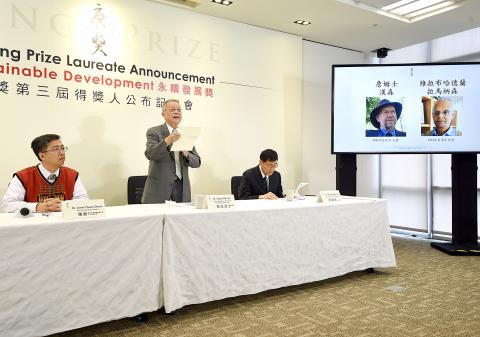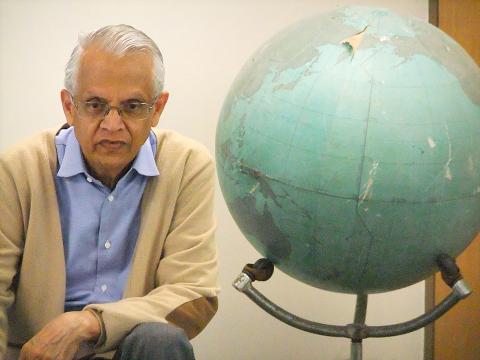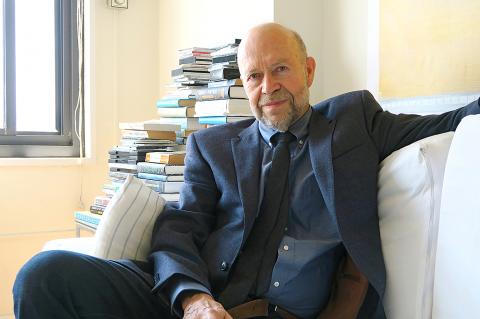The Tang Prize Foundation announced the winners of the 3rd Sustainable Development Award in Taipei on June 18. James Edward Hansen, director of the Program on Climate Science Awareness and Solution at Columbia University’s Earth Institute and Veerabhadran Ramanathan, Victor Alderson Professor, Applied Ocean Sciences, University of California, San Diego, jointly won the award.
The winners of the past three Tang Awards for Sustainable Development not only conducted groundbreaking research, they also went beyond the “ivory tower” of academia and directly influenced social initiatives and government decisions. The selection committee also pointed out that their influence on human society was key to their winning the prize.
Gro Harlem Brundtland, the winner of the first Tang Award for Sustainable Development, was the first person to define the term “sustainable development.” She was the chairperson of the UN World Commission on Environment and Development and was behind the publication of the report “Our Common Future” in 1987, the collective contribution of hundreds of experts from around the world. The report defined “sustainable development” as a development model “to ensure that it meets the needs of the present without compromising the ability of future generations to meet their own needs.”

Photo: Chien Jung-fong, Liberty Times
照片:自由時報記者簡榮豐
The winner in 2016, Arthur H. Rosenfeld, is known as the “Godfather of energy efficiency.” He led the US state of California’s battle to overcome its power crisis and his name became a measure of energy efficiency (1 Rosenfeld equals a saving of 3 billion kWh), along with other energy units such as watt (the unit of power) and volt (the unit of voltage).
The newly announced winners of the 3rd Sustainable Development Award also started from scientific research and then took their research into society, making a real impact on the world. Ramanathan proposed that atmospheric carbon black and other non-CO2 gases have a similar impact on global warming as CO2 (carbon dioxide), influencing the formulation of international carbon emissions policies.
Ramanathan not only talks the talk, he also walks the walk. He set up a foundation to promote “clean energy” in less-developed areas in India and discourage the burning wood and coal for cooking, in order to reduce the emission of bituminous coal-containing “carbon black.” The foundation’s goal is to improve public health on the one hand, while also reducing the threat of global warming

Photo courtesy of the Tang Prize Foundation
照片:唐獎教育基金會提供
James Hansen, the other winner of the third Tang Prize in sustainable development, worked for NASA for more than 30 years and has influenced many policies. Tang Prize Foundation chief executive Chern Jenn-chuan points out that many industry figures and politicians still do not believe in climate change and global warming. Hanson continues to fight against these people, and even went to court to confront them, for the sake of the fairness and justice for the next generation.
Chern adds that the two winners of the third Tang Prize are “frontier proponents” in the field of atmospheric pollution who have deeply influenced the government’s decision-making on many occasions.
(CNA, translated by Lin Lee-kai)

Photo courtesy of the Tang Prize Foundation
照片:唐獎教育基金會提供
唐獎教育基金會六月十八日在台北宣布第三屆永續發展獎得主,由哥倫比亞大學地球學院氣候科學-覺知與解決方案主任詹姆士‧漢森、加州大學聖地牙哥分校應用海洋科學講座教授維拉布哈德蘭‧拉馬納森二人共同獲獎。
唐獎永續發展獎三屆來的得主,不只是提出開創性研究,更走出學術象牙塔,直接訴諸社會倡議、影響政府決策。評選單位也指出,對人類社會的影響力,是得獎與否的關鍵。
第一屆得主格羅‧布倫特蘭,正是定義「永續發展」名詞的人,她於一九八七年領導聯合國世界環境與發展委員會,集結國際數百位專家學者的智慧,發表「我們共同的未來」報告,將永續發展正式定義為一發展模式,「既能滿足我們現今的需求,同時又不損及後代子孫滿足他們的需求」。
第二屆得主亞瑟‧羅森費爾德,有「能源效率教父」之稱,曾帶領美國加州度過電力危機,他的名字更成為測量節能的單位(一羅森費爾德等於節省三十億度電),與瓦特(功率單位)、伏特(電壓單位)並列。
最新揭曉的第三屆永續發展獎得主,也是從科學研究出發,進而走入社會,對世界產生真正的影響。拉馬納森提出,大氣黑碳等「非二氧化碳」氣體,對全球暖化的影響也接近二氧化碳,影響了國際碳排政策的制訂。
拉馬納森不只是出一張嘴,更身體力行,設立基金會到印度較落後地區推廣「清潔能源」,避免烹飪時燃燒木材、煤炭,以減少含「黑碳」的煙煤排放,一方面改善民眾健康,一方面也降低對暖化的威脅。
第三屆的另一位得主詹姆士‧漢森,在美國國家航空暨太空總署(NASA)工作三十餘年,影響許多政策。唐獎基金會執行長陳振川指出,許多產業界、政治人物,至今仍不相信氣候變遷和全球暖化,漢森為了下一代的公平正義,不斷和這些人抗爭,甚至不惜走上法庭對質。
第三屆的兩位得主,在空污的大氣化學領域中,都是「前沿性的倡議者」,在不同的場合情境下,深刻影響政府的決策。
(中央社)
About the Tang Prize
唐獎小檔案
★ 創辦人:尹衍樑
★ 四大獎助項目:永續發展、生技醫藥、漢學、法治
★ 獎金:每項五千萬元,其中四千萬元由得獎人領取,千萬元為後續研究獎金
★ 頒獎時間:兩年一次
★ 首屆得獎名單公布時間:二○一四年六月十八日
註:唐獎的獎金高於諾貝爾獎的三千五百萬元,曾是全球最高。
★ Founder: Samuel Yin
★ Four Awards: Sustainable Development,
Biotech Medicine, Sinology, and Rule of Law
★ Bonus: Each NT$50 million (US$ 1.6 million)NT$40 million will be collected by the winner, NT$10 million allocated for follow-up research
★ Award frequency: once every two years
★ First Tang Prize announced: June 18, 2014
Note: The bonus of the Tang Prize is higher than the 9 million Swedish krona (US$ 1.1 million) of the Nobel Prize, which used to be the highest in the world.

Like people in many other countries, Taiwanese are fond of delicious fried snacks. For example, Spain is known for its churros, and in Taiwan there is a traditional fried dessert made of sticky rice called beh teung guai. The snack consists of sticky rice flour that is mixed with water, kneaded into a dough and shaped into small pieces. Once fried, the sticky rice balls are coated in crushed peanuts and sugar mixture. 世界上有許多國家愛吃炸甜點,台灣也不例外。舉例來說,西班牙有吉拿棒,台灣人則有油炸糯米的點心──白糖粿。作法先將糯米粉和水混合揉成糰,再捏成小塊,炸好後裹上花生糖粉。 knead (v.) 揉(麵糰、黏土),捏;捏製;揉捏形成 Beh teung guai is a traditional snack that has been enjoyed by many senior citizens since

WHEN ARE THE OLYMPIC AND PARALYMPIC GAMES? The Paris 2024 Olympics will run from Friday to Aug. 11, while the Paris 2024 Paralympics will be held from Aug. 28-Sept. 8. WHERE WILL THE GAMES TAKE PLACE? In September 2017, the International Olympic Committee (IOC) awarded Paris the 2024 Games when its only remaining rival, Los Angeles, agreed to wait another four years to be the host city. Paris has hosted two Olympics and will stage the event 100 years after its last Games in 1924. The Games will be staged in 35 venues across Paris, Ile-de-France, on both mainland France and overseas. Some notable venues

A: The 2024 Paris Olympics is set to open tomorrow (Saturday Taiwan time), and will run until Aug. 11. B: How many Taiwanese athletes will compete in the Olympics? A: About 60 Taiwanese athletes will participate in 16 sports. B: I’ve heard some Olympic gold medalists, such as weightlifter Kuo Hsing-chun, and badminton duo Lee Yang and Wang Chi-lin, will compete in the Olympics again. A: Asian tennis star Hsieh Su-wei, who is the World No. 1 in women’s doubles, is also on the Taiwan team. Let’s give our support to the Taiwanese players. A: 巴黎奧運自7月26日(台灣時間27日),至8月11日要登場啦。 B: 台灣有多少選手參賽? A: 台灣有60名選手參賽,將參加16項運動種類。 B: 這次奧運金牌舉重名將郭婞淳、羽球男雙李洋/王齊麟都會參賽。 A:

You might have seen athletes gracefully bending and leaping in rhythm with melodies. This is “rhythmic gymnastics,” a sport often mistaken for artistic gymnastics. However, the two are distinct in focus and presentation. Artistic gymnastics focuses on strength, flexibility, and balance, with athletes performing solo on various equipment. They are scored based on the difficulty of their movements, their execution of certain skills on each apparatus, and their ability to combine multiple skills into different movements. Rhythmic gymnastics, on the other hand, emphasizes style and presentation, with athletes often performing in teams. Moving in harmony with music, they use